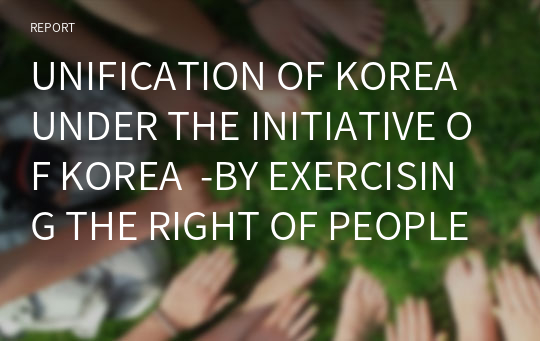UNIFICATION OF KOREA UNDER THE INITIATIVE OF KOREA -BY EXERCISING THE RIGHT OF PEOPLES TO SELF-DETERMINATION -
에이쁠만받아요
다운로드
장바구니
소개글
Due to simultaneous entry to the United Nations and individual actions in international society, the problems caused by legal status of South and North Korea have been complicated. Accordingly, South and North Korea is recognized as a different country. However, according to the international law and even their own treaty, the relation between South and North is defined as “the special relationship between two sides”. Therefore, under these legal bases, Korea can argue its rights of self-determination under the initiatives of Korea when North Korea is in sudden changes or contingency.Originally, the definition of self-determination was just a mere political or moral principle. But via the charter and resolution of the United Nations, its legal status was strengthened and further it is noticed as an Erga Omnes principle. Even though the subject of self-determination mentioned in the UN resolution “people” is defined ambiguously, it is clear that people of Korea as a whole does fit to the definition under the share of historical identity and territorial connectivity, language connectivity and the UN resolution.
‘Peoples of Korea” should practice the right of internal and external self-determination through three stages: the preparatory stage, the intermediate stage and the final stage. In the preparatory stage, Korea should argue for its leadership over discussion and process of unification by self-determination as a whole of Korea. In intermediate stage, if the sudden changes happen in North Korean region, the right of self-determination can be used for South Korean government to justify jurisdiction over North Korean territory. In the final stage, internal self-determination is exercised for the detailed process of unification as the norm.
However, there are several limitations.
목차
0. ABSTRACT1.PREFACE
2.LEGAL STATUS OF KOREAS
3.THE PRINCIPLE OF NON-INTERVENTION IN THE DOMESTIC MATTERS
4.THE SUBJECT OF SELF-DETERMINATION
5.THE PREREQUISITE OF SELF-DETERMINATION
6.PRACTICE OF SELF-DETERMINATION: COMPARISON WITH CASE OF GERMANY
7.STAGES OF EXERCISING SELF-DETERMINATION
8.PRACTICE OF SELF-DETERMINATION:ITS LIMITATION
9.CONCLUSION
10.REFERENCE
본문내용
“Our hope is unification”. It is a lyric from a well-known song about the unification of South and North Korea. After the Korean civil war, Koreas have been separated for nearly half a century. And today, they are the only divided countries in the world. Since the division, the discussions about the unification of Korea and the attempt to prove that both South and North Korea are one nation have been continued actively. Even though they act as different states in the international stage, their domestic law set their relations as state-state relations.Unification is a multifaceted concept; geographical meaning is the merging of divided territories, the political meaning is unification of the governmental systems and the economic meaning is an integration of economic blocs. Besides, the background of separation is tangled complicatedly not only with domestic matters but also with international affairs. Due to its complexity tangled with various issues, it is hard to achieve unification. However, the status of Korea as a whole is not only necessary for both South and North Korea but also important for international society and neighboring countries. Being a divided country contains inherent instability and uncertainty and these cause regional conflicts and economic instability as well. Therefore, for security, economic and political stability in the Northeast Asia region, the discussion of unification must be continued. Furthermore, to achieve unification in the harsh international society, South and North Korea must devise the way to achieve it by themselves under the legitimate way which is international law. This essay will treat with the current legal status of Koreas and the legitimate way to unify South and North Korea by practice of self-determination in the contingency case.
참고 자료
The 9th Edition of the international conference, European Integration Realities and perspectives, “Succession of States in Respect of Treaties”, Jana MafteiOccasional papers/ Reprints series in contemporary Asian studies (No.2 1986), “Peace and unification in Korea and international law” , Byung-Hwa Lyou
연세대학교 법학전문대학원, “한반도 통합과 자결권의 적용에 관한 고찰”, 홍성필
고려대학교 대학원, “자결권의 국제법적 고찰과 한반도 통일에서의 적용”, 이서희
고려대학교 대학원, “한반도 통일 이후 국가승계 문제에 대한 국제법적 고찰- 조약의 국가승계 문제를 중심으로-”, 이세복
외법논집, 제 39권 제 1호 (2015.2), “한반도 유사시 자결권 행사와 통일국가 건설”, 정대진
남북법제연구보고서, “남북통일시 북한지역 관할권 확보 방안 연구”, 이규창 (통일연구원 연구위원)



























